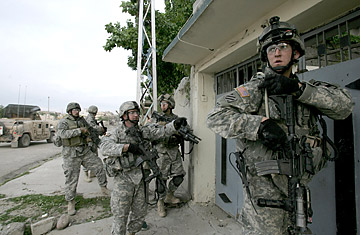
U.S. soldiers patrol the streets of Mosul
Colonel Gary Volesky's take on whether U.S. forces will continue to operate in the northern Iraqi city of Mosul beyond a June 30 deadline for withdrawal sounded almost as if he were fishing for an invitation. "If the Iraqi government wants us to stay, we will stay," said Volesky, commander of the U.S. combat brigade currently in Mosul. Volesky spoke with reporters via a teleconference from the main U.S. base in Mosul, which remains the last urban stronghold of the Sunni insurgency in Iraq. U.S. and Iraqi commanders, Volesky said, are assessing whether U.S. troops should stay in Mosul past June, which would conflict with a standing U.S.-Iraq agreement calling for all U.S. forces to withdraw from Iraqi cities by July.
Volesky refused to speculate on whether the Iraqi government would take the U.S. offer. "You know, a prediction's not helpful," Volesky said. "I really want the Iraqis to make that decision and not have a prediction from me." (See pictures of the campaign to control Mosul.)
So far, the Iraqi government has not asked for U.S. troops to remain in Mosul past June, despite high levels of violence there over the past year. Insurgents have kept up an aggressive presence in Mosul, Iraq's third largest city, despite repeated campaigns by U.S. and Iraqi security forces to rout them. Iraqi security forces most likely cannot successfully stamp out the insurgent networks in Mosul by themselves. But the Iraqi government may not be so keen to ask U.S. forces to stay. "It depends on the situation at the time," said Tahseen al-Shekhli, a spokesman for the Iraqi government. "If there is something out of control, we will ask them to stay."
Mosul emerged as the last major redoubt of the insurgency more than a year ago, when violence began dropping significantly in most of the rest of Iraq. The fear then among U.S. and Iraqi officials chiefly revolved around whether the lingering violence in Mosul would spread southward toward Baghdad and erode the security gains made during the U.S. surge. But that has not happened. In the past year, while Mosul has remained the most violent city in Iraq, the rest of the country, with the exception of Diyala province, has indeed seen the lower levels of violence that U.S. and Iraqi officials regularly tout. (See pictures of Obama behind the scenes in Iraq.)
Prime Minister Nouri al-Maliki initially promised a "decisive battle" in Mosul a year ago, when some wondered whether insurgent attacks there would renew bloodshed in Baghdad and other cities. That battle never came, of course. But al-Maliki has not seemed overly troubled by the fact that Mosul is effectively not under his control. It's been governance as usual for the Prime Minister, whose tangible political power essentially extends across a rump state that includes Baghdad and the oil-rich southern provinces of Iraq. On most days, al-Maliki appears content with that reality, and may remain so as long as the violence in Mosul continues to be contained to that city.
In other words, Mosul has become a kind of controlled burn in Iraq that does not appear to be an imminent threat to the rest of the country or of great concern to the government of Iraq. If Iraqi officials were truly worried about the fate of Mosul, they would have by now launched a bid to gain full control of the city, much as they did in Basra in March 2008. So if Iraqi security forces appear capable of continuing to manage the insurgency in Mosul — even without a foreseeable victory there — then Iraqi and U.S. officials could reasonably calculate that pulling U.S. troops from Mosul in step with the withdrawal timetable would preserve what overall gains the surge has made. In that case, al-Maliki may simply leave Mosul to its current status quo and chalk up the city as a sufferable loss to an insurgent movement that neither his forces nor the U.S. military has so far found a way to eliminate.
Moreover, if al-Maliki's government asks U.S. forces to stay in significant numbers in Mosul, any negotiated extension of the U.S. presence risks stoking political attacks from the Prime Minister's Shi'ite rivals. Any move by al-Maliki to allow U.S. forces to keep up major operations in Mosul may weaken his standing in parliamentary elections, which are expected to happen in December or January of next year.
Nothing about the strategic calculus unfolding now at high levels in Baghdad and Washington can offer much hope or comfort to the residents of Mosul, however. The Sunni insurgency has found its new, and perhaps permanent, home in Iraq and is highly unlikely to decamp on its own. That means Mosul, or large portions of it, will remain a scene of lawlessness and violence for some time to come, no matter what Iraqi and U.S. officials decide.
See how the U.S. is trying to keep the peace in multiethnic Mosul.
